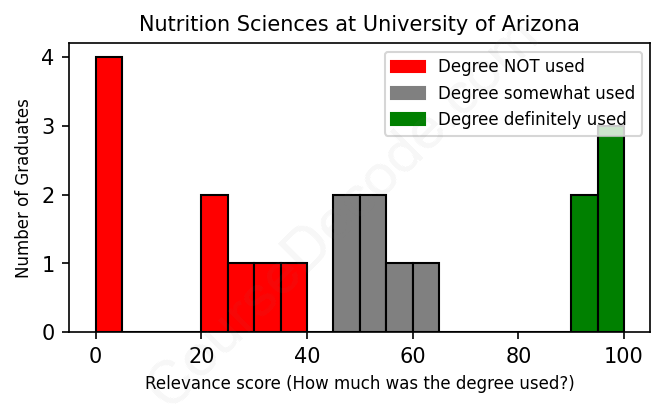
First, some facts. Of the Nutrition Sciences graduates from University of Arizona we've analyzed , here's how many have used (or NOT used) their degree in their career:

These are estimates based on AI analysis of 20 LinkedIn profiles (see below).
The verdict? Bad. Overall, with an average relevance score of 46%, Nutrition Sciences graduates from University of Arizona have a substantially lower likelihood (-21%) of finding work in this field compared to the average graduate across all fields:
And for comparison, here's the chart for all profiles we've looked at across all degrees.
Also, after graduating, 35% of these graduates have pursued further education other than another Bachelor's degree (such as a Masters degree or other), which is right in line with the average across all fields.
See the details:
|
Relevance score: 91% We think this person has gone into a career highly relevant to their degree. We think this person has gone into a career highly relevant to their degree.
DEGREE INFOGraduated in 2018 from University of Arizona with a Bachelor of Science - BS in Nutrition Sciences. Also pursued further education since (see below). JOB HISTORY SINCE GRADUATIONClinical Research Intern Banner Health Jan 2018 - May 2018 Associate, Laboratory Research  University of Arizona College of Medicine - Phoenix, Department of Child Health Feb 2020 - Jul 2021 Medical Scribe - Neurosurgery, Psychiatry  Phoenix Children's Hospital Sep 2018 - Sep 2019 Clinical Research Assistant  Phoenix Children's Hospital Sep 2019 - Aug 2020 Clinical Research Coordinator  Phoenix Children's Hospital Aug 2020 - Jul 2022 FURTHER DEGREES DONE SINCE GRADUATINGDoctor of Medicine - MDTulane University School of Medicine 2021 - 2025 ABOUTNo information provided. |
The top 10 most common jobs done by the graduates we've analyzed (ranked most common to least) are:
When we look at the job history of University of Arizona graduates in Nutrition Sciences, it’s pretty clear that a lot of them are working in roles that don't really connect to their degree. A significant number ended up in customer service or administrative positions, like front desk receptionists and customer service advocates. These jobs don't make use of any specialized nutrition knowledge or skills. Some graduates even took roles as pharmacists or healthcare recruiters, where their biology and health-related coursework might help, but again, the direct link to nutrition is pretty weak. Even the chiropractor positions presented don’t really use the nutrition knowledge gained in their studies.
However, there are some standout roles where graduates do utilize their Nutrition Sciences education effectively, like in positions as Registered Dietitians or Dietetic Interns. These jobs directly apply the skills and knowledge from their degree, focusing on dietary planning and nutrition counseling. Recently, roles like Dietetic Assistant and Clinical Dietitian have also started popping up for newer graduates. So while the data shows a mixed bag overall, there are definitely pathways in the nutrition field, especially for those who pursue internships or positions that directly involve dietary practices. Overall, while many jobs taken by graduates diverge from the core of Nutrition Sciences, there’s still hope for those looking to truly make a difference in this field through certain relevant roles.
Here is a visual representation of the most common words in job titles for Nutrition Sciences graduates (this is across all Nutrition Sciences graduates we've analyzed, not just those who went to University of Arizona):

When you dive into the career paths of University of Arizona graduates with degrees in Nutrition Sciences, it's a mixed bag, but there are definitely some clear trends. Right after graduation, many seemed to land roles that aren't directly linked to their degree, like front desk receptionists, assistant managers, or even roles in customer service. It looks like a lot of them took jobs in various industries to gain some experience and paycheck, which is pretty common when you're just starting out and might not find a direct nutrition-related role immediately. For example, a few graduates worked at places like Banner Health in food service roles or as patient care associates before steering their careers towards more specialized positions.
Fast forward five to ten years later, and you see a significant shift for some, especially those who stuck with it in the nutrition field. A handful transitioned into roles like registered dietitians and even clinical dietitians, showing that they're making their mark in the nutrition world after gaining experience. Others gravitated towards related fields like healthcare recruitment or other managerial roles, which, while not strictly about nutrition, still leverage their education in useful ways. However, there are also graduates who ended up in jobs that seem pretty far away from their degree, like tech or corporate positions, suggesting that not everyone followed a straight path into nutrition careers. Overall, if you're thinking about a degree in Nutrition Sciences, just know that while some grads take a while to find their niche, many eventually do find meaningful work related to what they studied.
Honestly, a Bachelor's degree in Nutrition Sciences can be challenging but not impossible. At the University of Arizona, you'll dive into a mix of science courses like biology and chemistry, along with nutrition-specific classes that require some serious commitment and study time. If you like science and are willing to put in the effort, you can definitely handle it. It's probably about average in difficulty compared to other health-related degrees, but be ready for some tough exams and lab work! Just stay organized, seek help when you need it, and you'll be fine.
Most commonly, in the LinkedIn profiles we've looked at, it takes people 4 years to finish a Bachelor degree in Nutrition Sciences.
Looking at these graduates from the University of Arizona, it's clear that their earnings levels vary quite a bit based on their roles and experiences. Some folks like the chiropractor and the registered dietitians are likely pulling in decent salaries, especially as they move into more senior roles. Others, like the front desk receptionists and some health service workers, probably aren’t making as much, especially early on in their careers. The ones who transitioned into management or specialized healthcare positions seem to be on a good path, while many in entry-level positions are still working their way up. Overall, it seems like a mixed bag—some folks are making decent money, while others might still be trying to hit their financial stride!
Here is a visual representation of the most common words seen in the "about" section of LinkedIn profiles who have a Bachelor degree in Nutrition Sciences (this is across all Nutrition Sciences graduates we've analyzed, not just those who went to University of Arizona). This may or may not be useful:

Here are all colleges offering a Bachelor degree in Nutrition Sciences (ordered by the average relevance score of their Nutrition Sciences graduates, best to worst) where we have analyzed at least 10 of their graduates:
| College | Score | Count |
|---|---|---|
 University of Connecticut University of Connecticut
|
85 | 11 |
 Penn State University Penn State University
|
76 | 13 |
 California Polytechnic State University-San Luis Obispo California Polytechnic State University-San Luis Obispo
|
75 | 12 |
 University of New Hampshire University of New Hampshire
|
71 | 10 |
 Arizona State University Arizona State University
|
70 | 12 |
 Texas A&M University Texas A&M University
|
70 | 19 |
 The University of Texas at Austin The University of Texas at Austin
|
60 | 21 |
 Montclair State University Montclair State University
|
59 | 10 |
 Kaplan University Kaplan University
|
54 | 12 |
 University of Arizona University of Arizona
|
46 | 20 |